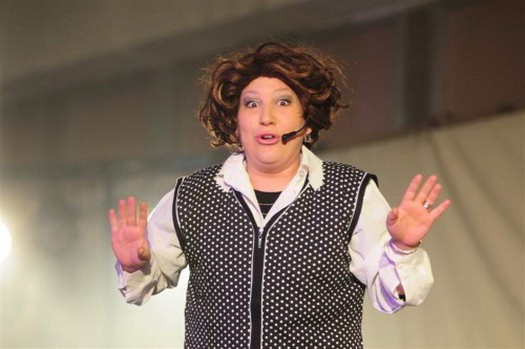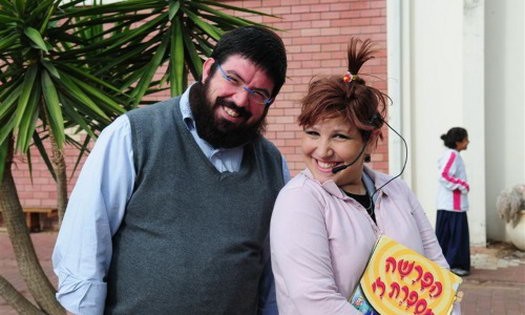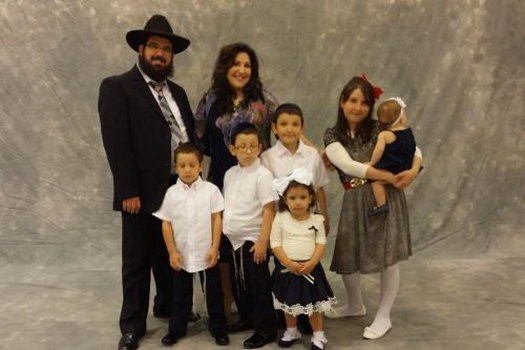
Meet Michal: The Orthodox-Jewish Female Comedian
As Michal Levitin gets up on stage to perform for the annual Conference for Chabad Women in Israel, the audience bursts out laughing. She hasn’t even opened her mouth yet. But every woman in the audience has seen Michal perform before, and the mere sight of her almost reflexively makes them laugh.
Funny from Birth
Michal, a 32-year-old mother of 6, has been performing for over 20 years. She grew up in the Chabad neighborhood of Kiryat Malachi, which was the perfect breeding ground for her comedic talent. The diverse neighborhood includes immigrants from Russia, Georgia, Bukhara, Ethiopia, Morocco and Yemen, and the jumble of languages, idioms and phrases inspired Michal. As early as age five, she could do exact impersonations of all the neighbors in her building, an act that made her family explode with laughter.
Michal shares: “I remember my grandmother saying, ‘Michal, perform for me. Dance for me, and I’ll give you something.’ She was the first to whet my appetite for performing and acting. My mother and grandmother bought me costumes and props so I could better express myself. My family encouraged me, applauded me, and let me perform all the time.”
When she was 10 years old, Michal performed with her mother at a woman’s evening event in Kiryat Malachi. Together, they dramatized episodes of family life, and Michal recited poetry. The audience loved her, and their applause was wildly enthusiastic. At that moment, she knew what she wanted to do when she grew up.
Concentrate on Making People Happy
That performance for an audience of local women was just the beginning. Michal began performing, usually as a volunteer, in other venues, including a school for at-risk girls, geriatric wards and homes for the elderly.
Through experience, Michal learned to perfect her craft. “Before every holiday, my mother and I would perform. My mother didn’t try to to fix or correct me, she just told me, ‘Concentrate on making your audience happy.’
“Since most of my performances were unpaid, there were no great expectations of me. It was all pure fun. I was self-confident and loved doing it. The attention and the applause—it’s every child’s dream.”
While Michal’s friends were experiencing typical adolescent angst, performing made Michal feel confident and secure. Her path was clear. She knew where she excelled.
“What’s going to become of you?”
While her family was very supportive, the educational establishment was not. Many of her elementary and high school teachers didn’t approve of her lighthearted ways. “Enough clowning around,” they would say. “You need to be more serious. Otherwise, what’s going to become of you?” Michal couldn’t understand it. “It says, ‘Serve G‑d with joy,” she told them. But they wouldn’t accept her as she was.
Michal says that the idea of giving a Jewish message through humor was met with skepticism. So, at the school’s end-of-year performance, when she requested a comedic role, she was refused.
Michal didn’t accept this, and she eventually got permission to go up on stage in a funny costume. “I pretended to be a balloon seller. I was given one minute of stage time, but there are people who still remember that performance.”
Since her comedic side was curtailed, Michal decided to focus on her singing, an area she also excelled in. During her high school years, Michal appeared with well-known singers in Chabad Houses all over the country.
“My grandfather, Rabbi Avraham Lieder, was a chazan. He was privileged to teach the Rebbe the song ‘Hoshea et Amecha.’ He encouraged me very strongly to sing. He taught me Chabad tunes, and was very particular that I sing them just as chassidim of old sang them. When I was a teen, he taught me some lesser-known songs. I was happy to be able to sing melodies that had never been performed before.”
Stand-Up with a Message
Michal was fortunate to meet a man who would share her life’s goal, Yossi Levitin. “Immediately after the wedding, he became a complete partner in my work, which became ‘our work.’ He’s the producer, the announcer, the driver, the schlepper and the sound guy.”
After the wedding, Michal decided to focus on her ability to make people laugh. She knew that there were many religious singers, both men and women, but that the field of stand-up was wide open. “I felt there was a lot of potential. I came up with some characters and began performing. My success was dizzying. Women loved it and asked for more and more.
“Before every performance, I sat down with the organizers, and we discussed the message they wanted to communicate. We created appropriate characters, and it worked. Women laughed while they internalized the deeper message of the performance.”
There were some who criticized Michal’s work, feeling that it was unseemly. But Michal continued anyway. “Their criticism didn’t shatter me. I knew that women were enjoying my routines, and they were gaining insights from the messages I was relaying. I knew that was my mission. So I continued.”
The teachers who once wondered “What will become of you?” have all attended Michal’s shows. They approach her after the show and admit that they hadn’t been able to imagine that she’d go so far with her talent for making people laugh. They tell her that she is able to transmit messages that they, as teachers, are not able to transmit.
Making Abba Laugh
Michal’s father battled a difficult illness for 13 years. In that time, he was in and out of hospitals and underwent a series of invasive operations. From the start, Michal’s mother told the whole family to be joyful in his presence: “Where Abba is, there can only be happiness. That’s what’s going to cure him.”
Michal says, “It was clear to me that the reason he continued to live so many years with such a devastating illness was because of that joy.”
Shmuel Lewis, of blessed memory, Michal’s father, was a ritual slaughterer(shochet). Until he became ill, he would travel all over the world to slaughter meat for kosher consumers. He spoke seven languages and worked with Michal to perfect her accents so that her impersonations would be even better. Whatever song she practiced had to meet his exacting standards. “Abba really loved my performances. He would laugh endlessly at my skits and mimicries and encourage me to continue. My experience of his sickness and death was shaped by our determination to focus on the joyous parts of life. We knew that this was the way to face adversity.”
Is Mommy angry?
Michal’s good sense of humor helps her parent in a positive way. “It takes my kids the longest time to realize that I’m angry. Even when I am really angry, they’re sure it’s part of a show, and they burst out laughing. Their laughter is contagious, and they get me to laugh with them.”
Michal says that humor is a wonderful educational tool. “Whenever a difficult situation comes up with the kids, I immediately introduce a comical character who gives her opinion about the situation. The kids pay much more attention to my characters than they do to me. It helps them come down from their high horse, or get out of the corner they’ve painted themselves into.”
All Michal’s children are skilled actors and singers, which is not surprising considering the home they’re raised in. In fact, one whole room is devoted to Michal’s costumes and props—which the kids dress up in year-round, not just on Purim. No wonder the kids’ friends always want to come play at the Levitins’ house!
How is a skit conceived?
I ask Michal how she comes up with ideas for her skits.
“The characters I play come from real life. They’re figures that I relate to. I make them extreme but honest, and that’s why women can relate to them. When I observe certain instances in real life, I know that someday I’m going to use them on stage.”
Michal says that in planning a skit, the first stage is defining the message that she wants to impart, whether it has to do with husband-wife relationships, raising children, or service of G‑d. Then she thinks about situations that would relay that message, and only then does she come up with characters. The final stage is the props. She chooses disguises and accessories from her costume room, which help her get into character.
“There were times when I performed spontaneously, with no props, but when I’m in costume, I identify completely with the personality I’ve created. There’s no question that it works best that way.”
Silent Show
As a Torah-observant stand-up comedian, Michal is firm about her boundaries. “I never use vulgarity or toilet humor. If, for example, I am performing a skit about a man whose wife gets very angry and wants to curse him, I’ll make a face and say, ‘He should be well.’ From the tone and the facial expression, everyone knows that I’m very angry. Non-religious women approach me after shows and tell me that it was a unique experience to laugh at humor that’s not crude; it’s a pure joy.”
When I ask Michal if there is anybody she would never mimic, she says, “I never make fun of people with disabilities.”
Most Memorable Performances
Of the thousands of shows Michal has performed, a few stand out in her memory. “There was a show to benefit Shema Koleinu,an organization for deaf women. Because they are deaf, I didn’t even need to add music to fill in the gaps between sketches. I was missing a prop for one of my impersonations, so I called out to my husband to ask him to bring it to me. It wasn’t even an issue because the audience was deaf. It was very strange. I tried to speak slowly and to exaggerate my lip movements, so that the women who read lips would be able to understand me.
“Someone projected a transcript that she was writing as I performed, and even included parenthetical remarks like ‘Moroccan accent’ and ‘Russian accent.’ The amazing thing was that the audience laughed. They didn’t laugh any less than a hearing audience. I was touched and shocked at the same time.”
Michal also remembers a performance in France. “It was a mixed group. Half were Hebrew speakers, and half spoke French. There was a simultaneous translation going on. It takes a lot longer to say things in French than in Hebrew, so half the audience would laugh at a funny line right away, and as soon as they’d finished laughing, the French speakers would start. It was so funny that I had to try hard not to laugh myself.”
Way Beyond Laughing
A few years ago, Michal performed for a group of women vacationing in a hotel in northern Israel. The phone rang as she and her husband were heading out to the car after the show. A woman who’d been in the audience was on the line. She said she had thought that this vacation would help her, but she wasn’t feeling any less down. She was suffering from postpartum depression and was feeling suicidal.
Michal spoke with her all through the night and arranged for the two of them to meet at a performance Michal was giving in another week, near the woman’s home. After the show, they met and spoke, and Michal gave her the schedule of her future performances. This woman traveled all over Israel, showing up at every one of those performances. She said that she was living for them, and that they were strengthening her. “We stayed in touch for two years, until she finally pulled out of her depression. Today, she helps treat women who are suffering from mental illness.”
Michal’s Dream
I ask Michal about her dreams for the future. As a Chabad chassid, Michal immediately answers, “My biggest dream is that Moshiach will come, the dead will be resurrected, and my father will be among them. On the professional front, I’d love to do stand-up for kids. Children these days are very bright, and I think that, through humor, I can get across some important concepts to them.”
















Anonymous
Why does it have to specify that she is female?. We can see that.I think it is insulting to say she is female,as if it is unusual for a woman to be a comedian,or anything else.
Pedant
what if really it were unusual for a woman to be an orthodox Jewish comedian, would that make you feel better cause it is, I promise.
Danielle Felger
Are you serious? All of this politically correct stuff about be “insulted” or “offended” is very effectively ushering back in Communism. Wake up please!
Do you know where the term Political Correctness originated? NAZI GERMANY. If you were not “pc”, they came to get you. If you don’t like what someone says, change the channel, read another website, search something else…whatever. Just move on with your life. While we still have our last shred of freedom in America, you can still choose who you pay attention to.
cnl
Michali is the best!
OMG!!!
I remember her!!
She us to come to my school !
When I was in Israel!
This lady is awesome!!!!
Chaya Mushka
BS”D I can’t find even ONE video of her online. I’m so sad, I want to see her!
karen roth
How can I, as Director of Recreation for an independent community for seniors, get in touch with Mchal?
Karen
Mazal Hazan
Michal,
It would be wonderful if you could post at least a short sample video. We frequently hold events up here in the north (Katzrin) and it would give the committee something to see when searching for talent.
Thank you, in advance.
Mazal
Danielle Felger
Amazing!!! Loved this article. Would you be kind enough to post a video of one of your performances? Also, I would like to know how to find out when and where your upcoming performances are. Please advise. Thanks!!!!